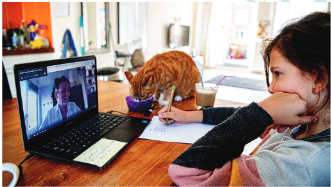Leia o texto para responder:

Your screen freezes. There’s a weird echo. A dozen heads stare at you. There are the work huddles, the one-on-one meetings and then, once you’re done for the day, the hangouts with friends and family. Since the Covid-19 pandemic hit, we’re on video calls more thanever before – and many are finding it exhausting.
Being on a video call requires more focus than a face-toface chat, says Gianpetro Petriglier, who studies sustainable development in the workplace. Video chats mean we need to work harder to process non-verbal cues like facial expressions, the tone and pitch of the voice,and body language. “Our minds are together when ourbodies feel we’re not. And that dissonance tires us out,”he says.Silence is another challenge, he adds.
“Silence createsa natural rhythm in a real-life conversation. However,when it happens in a video call, you become anxiousabout the technology.” One 2014 study by Germanacademics showed that delays on phone or conferencingsystems shaped our views of people negatively: evendelays of 1.2 seconds made people perceive the responderas less friendly or focused.
Our present-day circumstances – whether quarantine,working from home or otherwise – are also feeding in. Aspects of our lives that used to be separate – work,school, friends, family – are all happening in the samespace. Individuals have multiple aspects – context-dependent social roles, relationships, activities and goals– and we find the variety healthy, says Petriglieri. When these aspects are reduced, we become more vulnerable tonegative feelings.
A lack of downtime after we’ve fulfilled some work or family commitment may be another factor in ourtiredness, while some of us may be putting higher expectations on ourselves due to worries over the economy or job losses. “There’s also that heightened sense of ‘I need to be performing at my top level in asituation’... Some of us are kind of over-performing tosecure our jobs.”
Lots of us are doing big group chats for the first time,whether it’s cooking and eating a virtual dinner, attendinga university catch-up or holding a birthday party for a friend. If the call is meant to be fun, why might it feeltiring? Part of it is whether you’re joining in because you want to or because you feel you ought to. If you see it asan obligation, that means more time that you’re ‘on’ as opposed to getting a break.
Experts’ suggestions for Zoom1fatigue? Limiting video calls to those that are necessary. Considering if video chats are really the most efficient option. And maybe, says Petriglieri, if you want to reach out, go old-school. “Write a letter to someone instead of meeting them on Zoom. Tell them you really care about them.”
(Manyu Jiang. Disponível em: www.bbc.com, 22.abr.2020.Adaptado.)
1Zoom: a video communication platform for use in computers and smartphones
The first paragraph mainly points out
a) people’s unwanted overexposure to online activities.
b) the way video chats are helping us stay occupied and connected.
c) the multitude of activities made possible by the internet.
d) the omnipresence of video gatherings in people’s lives on current days.
e) technology flaws that interfere in our social communication.
